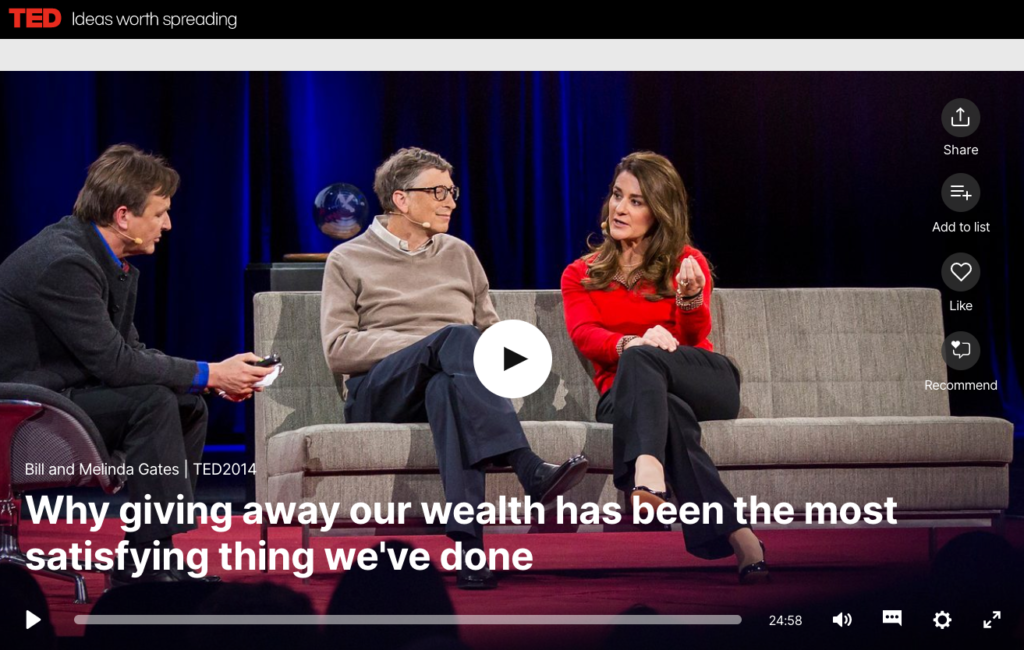No.05
So I’m watching this behavior in the classroom, and what do I notice? I notice that MBA students really exhibit the full range of power nonverbals. So you have people who are like caricatures of alphas, really coming into the room, they get right into the middle of the room before class even starts, like they really want to occupy space. When they sit down, they’re sort of spread out. They raise their hands like this. You have other people who are virtually collapsing when they come in. As soon as they come in, you see it. You see it on their faces and their bodies, and they sit in their chair and they make themselves tiny, and they go like this when they raise their hand. I notice a couple of things about this. One, you’re not going to be surprised. It seems to be related to gender. So women are much more likely to do this kind of thing than men. Women feel chronically less powerful than men, so this is not surprising. But the other thing I noticed is that it also seemed to be related to the extent to which the students were participating, and how well they were participating. And this is really important in the MBA classroom, because participation counts for half the grade.
ボキャブラリー
So I’m watching this behavior in the classroom, and what do I notice? I notice that MBA students really exhibit the full range of power nonverbals. So you have people who are like caricatures of alphas, really coming into the room, they get right into the middle of the room before class even starts, like they really want to occupy space. When they sit down, they’re sort of spread out. They raise their hands like this. You have other people who are virtually collapsing when they come in. As soon as they come in, you see it. You see it on their faces and their bodies, and they sit in their chair and they make themselves tiny, and they go like this when they raise their hand. I notice a couple of things about this. One, you’re not going to be surprised. It seems to be related to gender. So women are much more likely to do this kind of thing than men. Women feel chronically less powerful than men, so this is not surprising. But the other thing I noticed is that it also seemed to be related to the extent to which the students were participating, and how well they were participating. And this is really important in the MBA classroom, because participation counts for half the grade.
behavior:n. 態度、ふるまい
MBA:=Master of Business Administration 経営学修士
exhibit:vt. 示す、表に出す、表す、誇示する
the full range of ~:全ての(範囲の)〜
caricature:n. 戯画、パロディ
alpha:n. 第1のもの、第1級[等](ここでは「群れのボス」くらいの意味)
occupy:vt. 陣取る、占有する
spread out:広げる、展開する
raise one’s hand:手を挙げる、挙手する
virtually:adv. 事実上、実際には、ほとんど
collapse:vi. :つぶれる、崩れる、崩壊する、へたり込む、へたへた座り込む
tiny:a. (物・人・事が)とても小さい、ちっちゃい、ごくわずかの
a couple of ~:《主に米》2、3の〜、少数の〜
it seems to be ~:〜のように見える、思える
related to ~ :〜と関連した、関係のある
gender:n. ジェンダー、(社会的・文化的)性
cf. sex:n. (生物学上の)性
be likely to ~:〜する可能性が高い、〜しそうである、
much more:はるかに、ずっと、なおさら
chronically:adv. 慢性的に、絶えず
extent:n. 程度、度合い
cf. to the extent that …:〜という点で、〜する程度に応じて
(ここでの to which は to the extent that のこと)
participate:vi. (活動・行事などに)参加する、(積極的に)関与する (in)
cf. 「〜に参加する」には、join ~ / participate in ~ / take part in ~などがある。)
participation:n. 参加、関与
count for ~:〜の価値がある、〜に値する
grade:n.⦅主に米⦆成績, 評価, 評点(⦅英⦆mark)
half the grade 評価の半分


